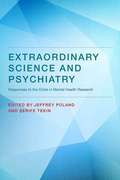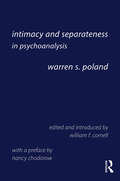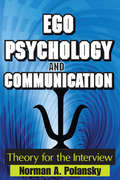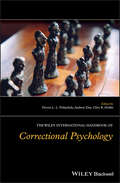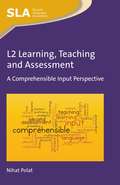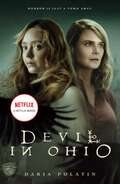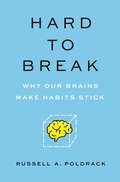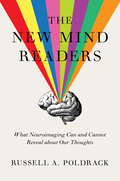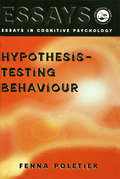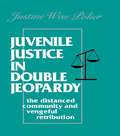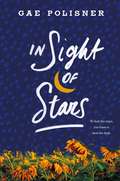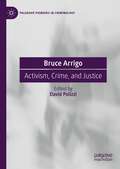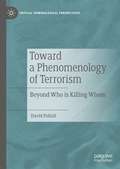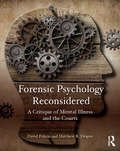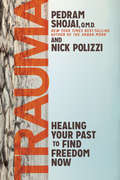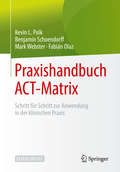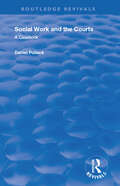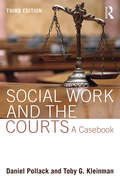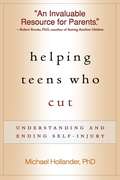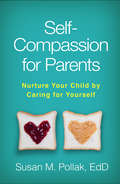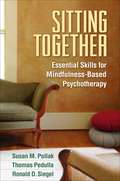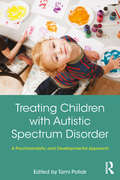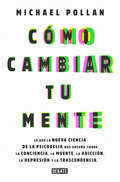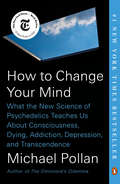- Table View
- List View
Extraordinary Science and Psychiatry: Responses to the Crisis in Mental Health Research
by Jeffrey Poland Serife TekinPsychiatry and mental health research is in crisis, with tensions between psychiatry's clinical and research aims and controversies over diagnosis, treatment, and scientific constructs for studying mental disorders. At the center of these controversies is the Diagnostic and Statistical Manual of Mental Disorders (DSM), which -- especially after the publication of DSM-5 -- many have found seriously flawed as a guide for research. This book addresses the crisis and the associated "extraordinary science" (Thomas Kuhn's term for scientific research during a state of crisis) from the perspective of philosophy of science. The goal is to help reconcile the competing claims of science and phenomenology within psychiatry and to offer new insights for the philosophy of science. The contributors discuss the epistemological origins of the current crisis, the nature of evidence in psychiatric research, and the National Institute for Mental Health's Research Domain Criteria project. They consider particular research practices in psychiatry -- computational, personalized, mechanistic, and user-led -- and the specific categories of schizophrenia, depressive disorder, and bipolar disorder. Finally, they examine the DSM's dubious practice of pathologizing normality.ContributorsRichard P. Bentall, John Bickle, Robyn Bluhm, Rachel Cooper, Kelso Cratsley, Owen Flanagan, Michael Frank, George Graham, Ginger A. Hoffman, Harold Kincaid, Aaron Kostko, Edouard Machery, Jeffrey Poland, Claire Pouncey, Serife Tekin, Peter Zachar
Intimacy and Separateness in Psychoanalysis
by Warren S. PolandClinical psychoanalysis serves as our best laboratory for exploring the riddle of what it is to be a person, and how a person is at once singularly unique while always a piece of the interpersonal fabric of humanity. In Intimacy and Separateness in Psychoanalysis, Warren Poland casts a freshly erudite eye on this paradox, resisting individual or intersubjective bias and avoiding the parochial allegiances common in our age of pluralism. Poland combines vivid reports from clinical analyses, literary readings, and his own life – all unfolding original observations on a person as both a part of and apart from human commonality. His consideration of how one person’s witnessing facilitates another’s self-definition, a concept extended here in his study of outsiderness as part of human nature, has been marked a keynote contribution. Clinical illustrations of moments that matter but are usually omitted from public presentation are set alongside examples of reading powerful fiction to show how analyst and author both incite fresh openness in a person’s mind. Poland goes farther, exposing the personal power of union and separateness in its keenest form, facing the ultimate separation of one’s own actual death. Only with separateness can true intimacy grow, and only within the fabric of others can true individuality exist. This evocative book, ranging from the lightness of whimsy to the dread of dying, allows every reader to taste of and learn from Poland’s thinking. Psychoanalyst or patient, writer or reader, each one living one’s own life – all can find new understandings in this work.
Ego Psychology and Communication: Theory for the Interview
by Norman PolanskyWriting in a lively straightforward tone and offering numerous examples, Polansky demonstrates that verbal communication plays a major role in mental health and is essential to preventing and curing emotional disorders. He shows why the inability to achieve effective speech reflects neurosis, interferes with self-healing potentials in the personality, and hampers patients in their efforts to make use of any of the talking therapies. He also makes clear how verbal expression leads to the growth of intimacy between people on a mature organized level and guards the individual against the existential anxiety of being completely alone in a potentially meaningless universe.Synthesizing basic theory that underlies skilled interviewing, the book serves as an introduction to ego psychology. It offers an appraisal of the role of verbal communication, especially in casework, individual therapy, and counseling, as well as in most group treatments situations. The author covers such topics as the resiliency of the ego, the logic of defenses, coping mechanisms, and the theory of object relations. He provides numerous illustrations of specific security and distance maneuvers found in everyday practice. He also describes techniques for dealing with these maneuvers by patients in face-to-face situations.This book is as vital to the field as when it first appeared in 1971. Polansky summarizes major concepts of modern ego psychology and relates them to what is known today about the process of verbal communication. It will be especially useful for those who seek to understand and treat the human personality through speech. Ego Psychology and Communication is designed for courses in social work, clinical psychology, educational counseling, guidance, and psychiatric nursing. Practitioners in social work, psychology, and psychiatry will find it to be a valuable addition to their personal reference libraries.
The Wiley International Handbook of Correctional Psychology
by Devon L. L. Polaschek Andrew Day Clive R. HollinA two-volume handbook that explores the theories and practice of correctional psychology With contributions from an international panel of experts in the field, The Wiley International Handbook of Correctional Psychology offers a comprehensive and up-to-date review of the most relevant topics concerning the practice of psychology in correctional systems. The contributors explore the theoretical, professional and practical issues that are pertinent to correctional psychologists and other professionals in relevant fields. The Handbook explores the foundations of correctional psychology and contains information on the history of the profession, the roles of psychology in a correctional setting and examines the implementation and evaluation of various interventions. It also covers a range of topics including psychological assessment in prisons, specific treatments and modalities as well as community interventions. This important handbook: Offers the most comprehensive coverage on the topic of correctional psychology Contains contributions from leading experts from New Zealand, Australia, Europe, and North America Includes information on interventions and assessments in both community and imprisonment settings Presents chapters that explore contemporary issues and recent developments in the field Written for correctional psychologists, academics and students in correctional psychology and members of allied professional disciplines, The Wiley International Handbook of Correctional Psychology provides in-depth coverage of the most important elements of the field.
L2 Learning, Teaching and Assessment: A Comprehensible Input Perspective
by Nihat PolatThis book explores second language (L2) learning, teaching and assessment from a comprehensible input (CI) perspective. This focus on the role of input is important for deepening our understanding of interactions between the learner, teacher and the environment as well as of the nature of the learning, teaching and assessment processes. The book takes a blended approach that promotes the intertwining of theory, research and practice in L2 pedagogy and assessment and aims to address the commonly used concept of CI and its role in L2 education. Content includes a comprehensive discussion of the conceptual foundation of CI; a multimodal and dynamic interpretation of CI from numerous perspectives; a critical discussion of well-known L2 acquisition theories and research; a practical examination of the role of multimodal forms of CI in L2 pedagogy; an analytical review of factors to be considered when modifying CI for pedagogical purposes in different settings and an overview of CI in L2 assessment. It will be of interest to students in the fields of L2 learning, teaching and assessment, teachers in second/foreign language settings and researchers of SLA and teacher education.
Devil in Ohio
by Daria Polatin"Devil in Ohio kept me up until 3 a.m. with the lights on–in a good way. It’s a haunting thriller for readers who like fear, humor, and heart in one package."—Meredith Goldstein, advice columnist and feature reporter for The Boston Globe, author of upcoming YA novel Chemistry Lessons."Gripping, urgent and addictive, Devil in Ohio balances the dark exploration of cults with a compelling and often humorous take on teen social dynamics. This is the debut you won’t want to miss."—Aditi Khorana, author of critically acclaimed The Library of Fates and Mirror in the SkyWhen fifteen-year-old Jules Mathis comes home from school to find a strange girl sitting in her kitchen, her psychiatrist mother reveals that Mae is one of her patients at the hospital and will be staying with their family for a few days. But soon Mae is wearing Jules’s clothes, sleeping in her bedroom, edging her out of her position on the school paper, and flirting with Jules’s crush. And Mae has no intention of leaving.Then things get weird.Jules walks in on a half-dressed Mae, startled to see: a pentagram carved into Mae’s back. Jules pieces together clues and discovers that Mae is a survivor of the strange cult that’s embedded in a nearby town. And the cult will stop at nothing to get Mae back.
Hard to Break: Why Our Brains Make Habits Stick
by Russell A. PoldrackThe neuroscience of why bad habits are so hard to break—and how evidence-based strategies can help us change our behavior more effectivelyWe all have habits we’d like to break, but for many of us it can be nearly impossible to do so. There is a good reason for this: the brain is a habit-building machine. In Hard to Break, leading neuroscientist Russell Poldrack provides an engaging and authoritative account of the science of how habits are built in the brain, why they are so hard to break, and how evidence-based strategies may help us change unwanted behaviors.Hard to Break offers a clear-eyed tour of what neuroscience tells us about habit change and debunks “easy fixes” that aren’t backed by science. It explains how dopamine is essential for building habits and how the battle between habits and intentional goal-directed behaviors reflects a competition between different brain systems. Along the way, we learn how cues trigger habits; why we should make rules, not decisions; how the stimuli of the modern world hijack the brain’s habit machinery and lead to drug abuse and other addictions; and how neuroscience may one day enable us to hack our habits. Shifting from the individual to society, the book also discusses the massive habit changes that will be needed to address the biggest challenges of our time.Moving beyond the hype to offer a deeper understanding of the biology of habits in the brain, Hard to Break reveals how we might be able to make the changes we desire—and why we should have greater empathy with ourselves and others who struggle to do so.
The New Mind Readers: What Neuroimaging Can and Cannot Reveal about Our Thoughts
by Russell A. PoldrackA revealing insider’s account of the power—and limitations—of functional MRIThe ability to read minds has long been a fascination of science fiction, but revolutionary new brain-imaging methods are bringing it closer to scientific reality. The New Mind Readers provides a compelling look at the origins, development, and future of these extraordinary tools, revealing how they are increasingly being used to decode our thoughts and experiences—and how this raises sometimes troubling questions about their application in domains such as marketing, politics, and the law.Russell Poldrack takes readers on a journey of scientific discovery, telling the stories of the visionaries behind these breakthroughs. Along the way, he gives an insider’s perspective on what is perhaps the single most important technology in cognitive neuroscience today—functional magnetic resonance imaging, or fMRI, which is providing astonishing new insights into the contents and workings of the mind. He highlights both the amazing power and major limitations of these techniques and describes how applications outside the lab often exceed the bounds of responsible science. Poldrack also details the unique and sometimes disorienting experience of having his own brain scanned more than a hundred times as part of a landmark study of how human brain function changes over time.Written by one of the world’s leading pioneers in the field, The New Mind Readers cuts through the hype and misperceptions surrounding these emerging new methods, offering needed perspective on what they can and cannot do—and demonstrating how they can provide new answers to age-old questions about the nature of consciousness and what it means to be human.
Hypothesis-testing Behaviour (Essays in Cognitive Psychology)
by Fenna H. PoletiekHow do people search evidence for a hypothesis? A well documented answer in cognitive psychology is that they search for confirming evidence. However, the rational strategy is to try to falsify the hypothesis. This book critically evaluates this contradiction. Experimental research is discussed against the background of philosophical and formal theories of hypothesis testing with striking results: Falsificationism and verificationism - the two main rival philosophies of testing - come down to one and the same principle for concrete testing behaviour, eluding the contrast between rational falsification and confirmation bias. In this book, the author proposes a new perspective for describing hypothesis testing behaviour - the probability-value model - which unifies the contrasting views. According to this model, hypothesis testers pragmatically consider what evidence and how much evidence will convince them to reject or accept the hypothesis. They might either require highly probative evidence for its acceptance, at the risk of its rejection, or protect it against rejection and go for minor confirming observations. Interestingly, the model refines the classical opposition between rationality and pragmaticity because pragmatic considerations are a legitimate aspect of 'rational' hypothesis testing. Possible future research and applications of the ideas advanced are discussed, such as the modelling of expert hypothesis testing.
Juvenile Justice in Double Jeopardy: The Distanced Community and Vengeful Retribution
by The Honorable PolierThroughout her entire career, Judge Polier continually fought for the rights and needs of the poor. In this volume she describes the granting and denial of justice toward the poor -- particluarly poor children -- she observed during her tenure as a Family Court Judge in New York City. The book discusses the current state of the justice system and the outlook for the future. This volume helps readers understand how broadly shared the responsibility for the neglect of today's youth is and how society must reshape its attitudes and realign its priorities to help the thousands of children who are dependent upon the public for care and support. The book identifies how the courts have been weakened by their loss of direct contact with delinquent and neglected children and the "need for humanity and respect in dealing with difficult human problems." (from the introduction). From her personal experiences and observations, Judge Polier describes the granting and denial of justice she observed while she consistently emphasizes the need for direct contact with delinquent and neglected children. For students, professional, and researchers in sociology, criminal justice, and any social science discipline dealing with children and children's problems, Polier's book provides a behind-the-scenes look at one of the major problems facing society today.
Cómo Crear Buenos Hábitos y Romper los Malos Hábitos: Guía Paso a Paso para Formar Buenos Hábitos y Romper los Malos
by Steven Polinsky¿Te encuentras participando en actividades que sabes que no son saludables para ti? ¿Sueles perder el tiempo en cosas que no importan? ¿Sabes lo que deberías estar haciendo pero de alguna manera no puedes hacerlo? ¿Eres incapaz de concentrarte? Si respondió afirmativamente a alguna de estas preguntas, esta guía puede ayudarlo a transformar su vida. ¿Le gustaría poder tener buenos hábitos, romper los malos, ser más saludable, ser más feliz, completar tareas con una mente clara? ¡Durante mucho tiempo, se han utilizado técnicas para matar malos hábitos para permitir que las personas tomen mejores decisiones en literalmente todos los aspectos de sus vidas! ¡El uso de estas técnicas también ayudará con la salud general, el presupuesto, ganar dinero, vivir bien, comer sano, tomar las mejores decisiones posibles, niveles de energía, concentración, felicidad general y mucho más! Experimenta emociones más positivas y una mejor calidad de vida al desarrollar esta habilidad esencial. ¡Presentamos los secretos que los profesionales usan para ser más efectivos que nunca! Concéntrese solo en lo que es importante y haga más cosas. ¡Con décadas de estrategias probadas, este libro electrónico le mostrará la forma más rápida y efectiva de acabar con los malos hábitos y desarrollar buenos hábitos para beneficiar su bienestar! Esta guía le enseña técnicas comprobadas sin el uso de suplementos caros, recetas o cursos. Qué está incluido: - Forma buenos hábitos. - Romper malos hábitos. - Sea más saludable y más feliz. - Tomar mejores decisiones. - Hacer mas dinero. - Tener más energía. - Reduce y elimina la ansiedad. - Tener más energía. - Haz más cosas. - Superar dolencias, obstáculos y problemas de por vida con facilidad! + MUCHO MÁS Si desea desarrollar buenos hábitos, mejorar el enfoque y el bienestar, esta guía es para usted. -> Desplácese hasta la parte superior de la pág
In Sight of Stars: A Novel
by Gae Polisner“An intense, sometimes graphic, totally heartbreaking portrait of a character who will keep pages turning.” - Booklist, Starred Review"An achingly fierce exploration of the way the world wounds us and heals us. If you love exquisitely written coming-of-age stories that will leave you breathless, In Sight of Stars is for you." - Jeff Zentner, William C. Morris award-winning author of The Serpent King and Goodbye DaysSeventeen-year-old Klee’s father was the center of his life. He introduced Klee to the great museums of New York City and the important artists on their walls, he told him stories made of myths and magic. Until his death. Now, forced to live in the suburbs with his mom, Klee can’t help but feel he’s lost all the identifying parts of himself—his beloved father, weekly trips to the MoMA, and the thrumming energy of New York City. That is until he meets wild and free Sarah in art class, with her quick smiles and jokes about his “brooding.” Suddenly it seems as if she’s the only thing that makes him happy. But when an act of betrayal sends him reeling, Klee lands in what is bitingly referred to as the “Ape Can,” a psychiatric hospital for teens in Northhollow. While there, he undergoes intensive therapy and goes back over the pieces of his life to find out what was real, what wasn’t, and whether he can stand on his own feet again. Told in alternating timelines, leading up to the event that gets him committed and working towards getting back out, Gae Polisner’s In Sight of Stars is a gorgeous novel told in minimalist strokes to maximal effect, about what makes us fall apart and how we can put ourselves back together again.
Bruce Arrigo: Activism, Crime, and Justice (Palgrave Pioneers in Criminology)
by David PolizziThis book examines various aspects of the work of Bruce Arrigo related to therapeutic jurisprudence, criminal justice ethics, and the place of critical theory in criminology and related fields. Arrigo’s work spans over thirty years and during that time has been an important voice in the practical and theoretical application of post-modern and critical theoretical approaches to mental illness, the practice of forensic psychology, and a wide variety of critical reflection concerning incarceration, rehabilitation, and the ethical practice within the criminal justice system. Each individual contributor offers their own perspective on his work and its specific influence on the topic under discussion. This book speaks to academics focused on the application of critical criminological theory within a variety of disciplinary contexts. These include forensic psychology, psychological jurisprudence, criminal justice ethics, and philosophically based critiques of the law and mental health and criminal justice activism.
Toward a Phenomenology of Terrorism: Beyond Who is Killing Whom (Critical Criminological Perspectives)
by David PolizziThis book examines the socio-psychological dynamics and drivers of terrorism from a humanistic perspective. Most interpret terrorism as meaningless, asocial violence but this book argues that it's not just a case of seeing 'who is killing whom' but that defining and understanding terrorism is configured by historical context and immediate experience. The author argues that these acts of terrorist violence can be interpreted as the external expression of repressed feelings and impulses that have been tabooized by mainstream society. Upon release, these terrorists gain a new 'nomos' which generates a sense of meaning and significance for them. This book draws on psycho-analytical theories of repression, Heideggerian existentialism, Berger’s anthropological concept of culture as ‘nomos’, and Roger Griffin’s analysis of terrorist fanaticism, adding to the understanding terrorism and criminality from a new perspective and beyond the usual literature situated in political science, security/war and peace studies. This book seeks to provide: a definition of terrorism, an account of the psychological theory, an explanation of the nomic dimension of terroristic violence, an exploration of the relevance of the new approach to understanding: Salafi jihadism, Al-Qaeda, Islamic State, the Taliban, White Supremacism, the rise of the Radical Right, and reflections on this for combating terrorism. It appeals to those interested in terrorism, conflict, terrorist radicalization and motivation, international relations, politics and religious politics, and to counter-terrorism agencies.
Forensic Psychology Reconsidered: A Critique of Mental Illness and the Courts
by David Polizzi Matthew R. DraperForensic psychology is where psychology meets the criminal justice system. An understanding of the intersection of criminal law and psychological issues relating to criminal responsibility is critical for criminal justice students. This accessible text focuses on the criminal law implications of forensic psychology as it relates to topics such as competency to stand trial, state of mind at the time of the crime, suicide by cop, and involuntary psychiatric medication administered in custody. Unlike more traditional texts on this topic, which are primarily concerned with the clinical practice of forensic psychology, this book focuses on critical thinking as it relates to these topics. Each chapter presents a critical analysis of the topic under study, going beyond merely identifying the legal parameters of criminal responsibility to explore the ethical, philosophical, and theoretical foundations of that concept.
Trauma: Healing Your Past to Find Freedom Now
by Nick Polizzi Pedram ShojaiYou are not doomed to be trapped by your traumaTrauma is unresolved pain. It hums in the background of our lives and robs us of the joy, faith, peace, and love we fully deserve. In their groundbreaking book, Pedram Shojai, O.M.D., New York Times best-selling author of The Urban Monk and The Art of Stopping Time, and Nick Polizzi, author of The Sacred Science, take you on a journey that encompasses: • a clear understanding of trauma, where it comes from, and how it affects every part of your life • an exploration of modern and ancient therapies and practices for healing • real-life tragedies turning into stories of triumph, hope, and survival Drawn from the wisdom and insights of the world's top doctors, therapists, and experts, Trauma will show you that no matter what you have endured, how long you have carried it, or how deeply embedded it is, you can be free from pain and suffering. Your road to recovery and whole-body healing is before you, and with it the richer and more profound connections that you seek with yourself and your loved ones.
Praxishandbuch ACT-Matrix: Schritt für Schritt zur Anwendung in der klinischen Praxis
by Kevin L. Polk Benjamin Schoendorff Mark Webster Fabián OlazDieses Fachbuch bietet einen praktischen Leitfaden für den effektiven Einsatz der ACT-Matrix (als kondensierter Form der Akzeptanz- und Commitmenttherapie) in Psychotherapie, Coaching und Beratung. Praktikerinnen und Praktiker erhalten eine Schritt-für-Schritt-Anleitung sowie zahlreiche nützliche Werkzeuge für die Matrixarbeit.Zahlreiche Beispieldialoge und FAQ-Abschnitte unterstützen die klinische Praxis, wobei stets lebendige Prozesse in konkreten Kontexten, nicht schablonenhafte Lösungen, vermittelt werden. Optional lesbare Vertiefungen bieten theoretisch interessierten Praktikerinnen und Praktikern Gelegenheit, Bezüge zur Bezugsrahmentheorie herzustellen und neue abzuleiten.
Social Work & the Courts: A Casebook
by Daniel Pollack Toby G. KleinmamSocial Work and the Courts is a compendium of the most recent and important legal cases in social work and social welfare. Its dissection and analysis of crucial cases makes it an excellent tool for teaching social workers to understand the legal system and its operation. The book demonstrates how courts view and deal with the performance, action, and conduct of social workers and their agencies. This second edition includes more case studies, paying particular attention to recent cases on foster care and child welfare. In addition, a new section on "References and Further Readings" has been added to the end of each chapter along with an update bibliography and Internet bibliography so that readers may easily find supplementary information.
Social Work and the Courts: A Casebook
by Daniel Pollack Toby G. KleinmanSocial Work and the Courts is a collection of important and cutting-edge court decisions in the field of human services, now in its third edition. Pollack and Kleinman present an array of legal cases in everyday language, with clear explanation of the facts and issues, and in-depth examinations of the reasoning and implications of each decision. This new edition includes over twenty new cases, all of which happened between 2010 and 2014, making this one of the most significant and timely investigations of how social work and the law intersect. Special attention is paid to recent rulings in child welfare and social worker liability. The dissection and analysis of these influential cases makes this volume an excellent teaching tool and an essential resource for both social workers and policy makers.
Helping Teens Who Cut: Understanding and Ending Self-injury
by William Pollack Michael HollanderDiscovering that your teen "cuts" is absolutely terrifying; before you understand what really motivates cutting, you may worry your child is contemplating suicide. What can you do to help when every attempt to address the behavior seems to push him or her further away? In this compassionate, straightforward book, Dr. Michael Hollander, a leading authority on self-injury, spells out the facts about cutting--and what to do to make it stop. You'll learn how overwhelming emotions lead some teens to hurt themselves, and how proven treatments--chief among them dialectical behavior therapy (DBT)--can help your child become well again. Helping Teens Who Cut demonstrates how to talk to your teen about cutting without making it worse, and explains exactly what to look for in a therapist or treatment program. Drawing on decades of clinical experience as well as the latest research, Dr. Hollander provides concrete ways to help your son or daughter cope with extreme emotions without resorting to self-injury. You'll also learn practical communication and problem-solving skills that can reduce family stress, making it easier to care for yourself and your teen during the recovery process.
Self-Compassion for Parents: Nurture Your Child by Caring for Yourself
by Susan M. Pollak"I yelled at the kids again--and feel so ashamed." "I barely have time to shower, let alone exercise; no wonder I’m so out of shape." "I'm just not the dad I hoped I would be." Parenting is hard. That's why self-compassion is so important. In this empathic resource, mindfulness expert and psychologist Susan M. Pollak helps you let go of constant self-judgment and treat yourself with the same kindness and caring you strive to offer your kids. Simple yet powerful guided meditation techniques (most under three minutes long) are easy to practice while doing the dishes, driving to work, or soothing a fussy baby. Learn to respond to your own imperfections like a supportive friend, not a harsh critic. You will find yourself happier and more energized--and will discover new reserves of patience and appreciation for your kids.
Sitting Together
by Susan M. Pollak Thomas Pedulla Ronald D. SiegelThis practical guide helps therapists from virtually any specialty or theoretical orientation choose and adapt mindfulness practices most likely to be effective with particular patients, while avoiding those that are contraindicated. The authors provide a wide range of meditations that build the core skills of focused attention, mindfulness, and compassionate acceptance. Vivid clinical examples show how to weave the practices into therapy, tailor them to each patient's needs, and overcome obstacles. Therapists also learn how developing their own mindfulness practice can enhance therapeutic relationships and personal well-being. The Appendix offers recommendations for working with specific clinical problems. Free audio downloads (narrated by the authors) and accompanying patient handouts for selected meditations from the book are available to purchasers at the companion website.
Treating Children with Autistic Spectrum Disorder: A psychoanalytic and developmental approach
by Tami PollakTreating Children with Autistic Spectrum Disorder: A Psychoanalytic and Developmental Approach outlines a unique model, the product of over twenty years of experience in working with children with this diagnosis within "Shaked" - a multi-professional educational-therapeutic day-car unit in Israel. This book provides a comprehensive overview of this model and the psychoanalytic-developmental perspective underpinning it, which weaves together the various professional views into a single fabric integrating a therapeutic network which encompasses each and every aspect of the child's development. Drawing on psychoanalytic and developmental psychology, each chapters is devoted to the daily problems that arise when working with ASD children, such as weaning and toilet training, as well as the effects of ASD on wider family functioning, all in the context of administering treatment to young children in day-care and other non-residential settings. Treating Children with Autistic Spectrum Disorder offers an essential, practical guide which will be an asset to any clinician working with young children on the autistic spectrum, as well as the parents and siblings of these children.
Cómo cambiar tu mente: Lo que la nueva ciencia de la psicodelia nos enseña sobre la conciencia, la muerte, la adicción, la depresión y la transcendencia
by Michael PollanUna brillante y valiente investigación de Michael Pollan, autor de cinco best sellers de The New York Times, sobre la revolución médica y científica en torno a las drogas psicodélicas, y la fascinante historia de sus propias experiencias psicodélicas que le cambiaron la vida. Cuando Michael Pollan se propuso investigar por qué el LSD y la psilocibina (el ingrediente activo de las setas mágicas) brindaban un enorme alivio a las personas que padecían condiciones difíciles de tratar como el TEPT (trastorno por estrés postraumático), la depresión o la adicción, no tenía la intención de escribir lo que es indudablemente su libro más personal. Pero al descubrir cómo estas notables sustancias estaban mejorando la vida no solo de los pacientes con problemas de salud mental sino también de las personas que simplemente se enfrentaban a los altibajos de la vida cotidiana, decidió explorar los límites de la mente en primera y tercera persona. Así comenzó una singular aventura entorno a la experiencia de la conciencia alterada, así como una profunda inmersión en el estudio de la neurociencia más pionera y la toma de contacto con una prodigiosa comunidad subterránea de expertos psicodélicos. En esta ejemplar investigación periodística, Pollan revisa archivos históricos y documentos científicos para separar la verdad sobre estas misteriosas drogas de los mitos, la propaganda y el pánico moral que se ha ido acumulando desde los años sesenta, cuando un puñado de personajes rebeldes catalizaron una poderosa reacción contra lo que entonces era un prometedor campo de investigación. Sugerente, polémico y deslumbrante este libro es el resultado de un viaje a una nueva, emocionante e inesperada frontera de la percepción, de nuestra comprensión de la mente, del yo y de nuestro lugar en el mundo.
How to Change Your Mind: What the New Science of Psychedelics Teaches Us About Consciousness, Dying, Addiction, Depression, and Transcendence
by Michael PollanNew York Times Book Review 10 Best Books of 2018A New York Times Notable Book The #1 New York Times bestseller.A brilliant and brave investigation into the medical and scientific revolution taking place around psychedelic drugs--and the spellbinding story of his own life-changing psychedelic experiences When Michael Pollan set out to research how LSD and psilocybin (the active ingredient in magic mushrooms) are being used to provide relief to people suffering from difficult-to-treat conditions such as depression, addiction and anxiety, he did not intend to write what is undoubtedly his most personal book. But upon discovering how these remarkable substances are improving the lives not only of the mentally ill but also of healthy people coming to grips with the challenges of everyday life, he decided to explore the landscape of the mind in the first person as well as the third. Thus began a singular adventure into various altered states of consciousness, along with a dive deep into both the latest brain science and the thriving underground community of psychedelic therapists. Pollan sifts the historical record to separate the truth about these mysterious drugs from the myths that have surrounded them since the 1960s, when a handful of psychedelic evangelists inadvertently catalyzed a powerful backlash against what was then a promising field of research.A unique and elegant blend of science, memoir, travel writing, history, and medicine, How to Change Your Mind is a triumph of participatory journalism. By turns dazzling and edifying, it is the gripping account of a journey to an exciting and unexpected new frontier in our understanding of the mind, the self, and our place in the world. The true subject of Pollan's "mental travelogue" is not just psychedelic drugs but also the eternal puzzle of human consciousness and how, in a world that offers us both suffering and joy, we can do our best to be fully present and find meaning in our lives.
